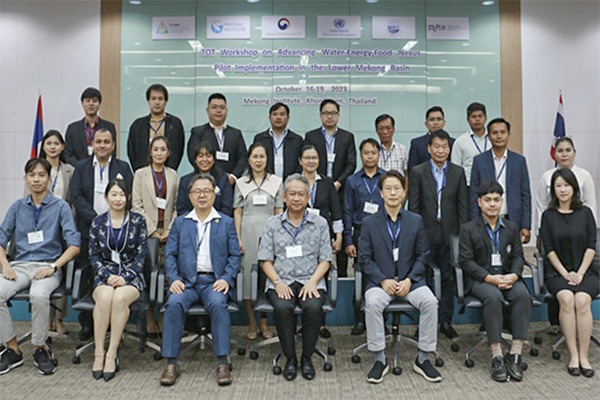
With supported of the Ministry of Science and ICT, Republic of Korea, the First Regional Training of Trainers (TOT) workshop on “Advancing Water-Energy-Food (WEF) Nexus Pilot Implementation in the Lower Mekong Basin” was co-organized by UNOSSC and the Mekong Institute (MI) from 16 to 19 October 2023 in Khoen Kan, Thailand.
Responding to urgent needs to address integrated resource management in the Mekong sub-region, the workshop aimed to foster deeper understanding of the WEF Nexus approach through a conceptual and practical perspective by sharing of technical skills, regional perspectives, knowledge and experiences.
Specifically, the event facilitated finetuning of national pilots in Cambodia, Lao PDR, Thailand and Viet Nam under the “Triangular Cooperation for Sustainable Development in the Lower Mekong Basin Project” also known as P-LINK.
“The concept of the WEF Nexus has become widely used in the international development community,” Mr. Suriyan Vichitlekarn, MI Executive Director explained in his welcome remarks during the training. “The Nexus framework explores interlinkages among vital sectors to foster resource efficiency, reduce pollution, and harmonize policies.”
“The workshop also serves as a unique platform for forging new partnerships and strengthening existing ones… The diversity of perspectives and expertise in this room is a testament to the power of South-South cooperation in addressing complex global challenges,” said Ms. Xiaojun Grace Wang, UNOSSC Trust Fund Director. She encouraged active collaboration among participants to examine the challenges and opportunities presented by the Nexus, identify best practices, and explore innovative solutions that can enhance resilience and sustainability in the Mekong and beyond to leave no one behind.
Joining the 4-day event were 17 participants from four participating countries of P-LINK including representatives from the National Mekong Committees (NMCs), line ministries and local government from the selected pilot sites.
Most of the participants will be directly engaged in the implementation of the national pilots in their respective countries. As implementing parties under the P-LINK, representatives from the Mekong River Commission Secretariat (MRCS) and the Science and Technology Policy Institute (STEPI) attended the event to provide technical guidance.
The event contributed to enhancing good practices and lessons learned on WEF nexus initiatives and the role of science, technology and innovation (STI) as an enabling mechanism for integrated resource management and coordination.
Following the official launch of national pilots in the four countries, a follow-up online event will be organized in April 2024. This post-workshop engagement will allow participants to share the progress and outcomes of their national pilot projects and promote South-South and triangular cooperation through their technical exchanges.
About the Project
The “Triangular Cooperation Project on Sustainable Development in the Lower Mekong River Basin based on the Water-Energy-Food (WEF) Nexus” (2021-2025) aims to strengthen access to water, food and energy for vulnerable communities living in the Lower Mekong Basin (Cambodia, Lao PDR, Thailand, and Viet Nam) through strengthening development approaches and management in these sectors. It will take integrative and multi-sectoral approaches in application of highly demanded technologies on water, energy and food to improve the livelihoods of the people based on South-South and triangular cooperation modalities. The 5-year project is supported by the Ministry of Science and ICT, Republic of Korea, and the UN Office for South-South Cooperation (UNOSSC) leads the project in partnership with other institutions including the Mekong River Commission Secretariat (MRCS), Mekong Institute (MI) and the Science and Technology Policy Institute (STEPI) and will enlist the help of other UN Agencies.
